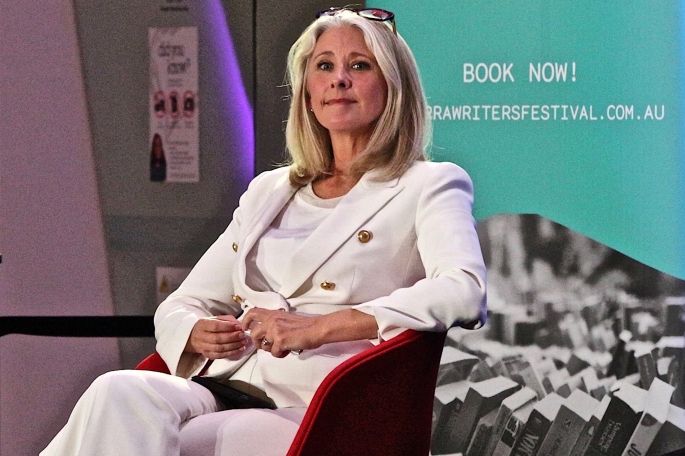ORIGINALLY PUBLISHED ON THEBIGSMOKE.COM.AU

In her best selling feminist memoir The Good Girl Stripped Bare, Tracey Spicer articulates the issue of entrenched workplace sexism and bullying, a condition which she has encountered and countered in a long and successful career in the media. As a matter of fact, Tracey and I were colleagues at the same regional Victoria media outlet over 30 years ago. I was impressed with Tracey’s journalistic ability as I was with her ability to hold her own against the ‘boys club’ in the boardroom or at the pub on a Friday night. Through her book, to my shame, I discovered that Tracey only went along with that culture, because, as she put it ‘that’s what you do’. As a straight white male who has spent more than 30 years working in media, I spent most of it oblivious that female colleagues were forced in some cases to play a subservient game in order to further their careers. And this was the beginning of a role that Spicer believed she had to play.
Tracey’s journalistic journey began at High School when she became besotted with a sophisticated, slim and exotic looking woman on TV, Jana Wendt. Living in a low socioeconomic rough suburb amid a dearth of role models, Jana’s sophistication completely enchanted the bleach haired bogan from outer Brissie.
As she moved through Channels Ten and Nine, she was shocked with the widespread attitude held by male executives who felt entitled to use female staff as their own personal Barbie Dolls. This shocked Tracey, as she grew up being told that she could do anything, optimistically believing that the misogyny would soon dissipate. Three decades on and now able to boast a highly successful on-air television career, Tracey is confident that younger women will now benefit from her ultimate refusal to be treated as a second class citizen.
This shocked Tracey, as she grew up being told that she could do anything, optimistically believing that the misogyny would soon dissipate.
Spicer was approached by Harper Collins to write her memoir after performing a stand-up comedy routine in a dingy Marrickville theatre, to which she was ‘dragged’ by Wendy Harmer. Spicer says even though it took her two months to accept, the idea was instantly appealing as she believes comedy is a great way to get a serious message across.
In The Good Girl Stripped Bare, the recently turned 50-year-old mother of two opens up about illicit drug abuse, masturbation and being a ‘failed Lesbian’. She also sets the record straight on the wording and design of a tattoo she has on her posterior. Spicer firmly believes there must be total honesty in such a project, and shares the story of a time when her son walked into her room while she was battling a draft page which deals with her first lover, a hairbrush called Fred. He responded with derision when she told him she was writing about how at fourteen she used a hairbrush to pleasure herself.
The journalist set aside three days a week for eight months to work on The Good Girl Stripped Bare – a work she didn’t want to be about her, but rather about the problems faced by women in the workplace and in society. Spicer sees the culture in media organisations has noticeably changed, at the time of her legal action, she noticed that advertisers were seeking more mothers and older women on air.
She says ‘…(we) were the ones who routinely got sidelined due to the obsession about women’s appearance in society, in particular on TV, so for the last 10 years it’s been mothers sought after in the workplace and women are allowed to get a bit older on TV. Some have even made it to 60’. But Spicer adds ‘unfortunately we’re still not seeing enough equality of women in executive positions in the media and change won’t come from the top so something has to happen’. Spicer says there is some change in the level of sexual harassment ‘but there’s still an awful lot of groping and grabbing and inappropriate comments’.
Spicer, whose TEDx talk The Lady Stripped Bare has been seen by more than two and a half million people, has also mastered the art of surviving social media. She describes it as ‘a systematic way to silence opinionated people’ and has been burnt by its ‘nasty nature and perverse practitioners’. She says ‘…people say it’s just online it’s not the real world, but it does spill over into your real life, that kind of bullying, and the hate eats away at your confidence and sends you into bouts of anxiety and depression and it makes you want to leave the industry’.
Tracey has over the years learnt strategies to manage the sometimes relentless onslaught of it and says ‘to be honest with you, it’s water off a duck’s back but it took me four years to work out how to block abuse, when to use humour, when to put the device down and when to go for a walk on the beach’
As for future projects, Spicer is keen to gather together feminists from around the world – writers from India and Africa – to help define intersectional feminism where inequality isn’t gender based or race based it’s a combination of things including your sexuality, your culture, your disability. In the words of the author: ‘There are a lot of people suffering worse than this middle aged white woman.’
From an article on TBS thebigsmoke.com.au
